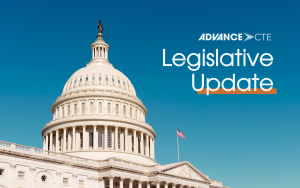
This week, the Senate Parliamentarian issued several rulings regarding Republicans’ forthcoming budget reconciliation bill that conflict with the chamber’s legislative requirements. Elsewhere, concerns remain over the Interagency Agreement between the U.S. Department of Education and U.S. Department of Labor, Congress took a few more early steps in the fiscal year 2026 appropriations process, and the Senate Health, Education, Labor, and Pensions Committee held a hearing on education and labor nominations.
Reconciliation Takes a Byrd Bath in the Senate
This week, Senate Republicans’ progress on the reconciliation mega-bill was partially stalled, as procedural processes required under the chamber’s “Byrd Rule” have been underway. The primary benefit of the wider budget reconciliation process is that it allows the Senate to circumvent the legislative filibuster, requiring only a simple majority threshold in the Senate to pass the chamber. In the Parliamentarian’s ongoing review, Senators debate whether specific provisions within the legislation violate the Byrd Rule, ultimately requiring that they be amended or removed from the bill entirely – a longstanding process known as the “Byrd Bath”.
This week, the Parliamentarian flagged several aspects of the Senate Health, Education, Labor, and Pensions (HELP) Committee’s proposal for reconciliation. Provisions found to be in violation of the Byrd Rule by the Senate Parliamentarian this week include the removal of postsecondary aid eligibility for certain non-citizen immigrants, narrowing loan repayment options to a fixed or new income-based plan, limits to Public Service Loan Forgiveness through excluding internships and residency and, most notably for the CTE community, the proposed eligibility expansion of the federal Pell Grant program for shorter-term programs, high-quality CTE programs – an effort often referred to as “Workforce Pell.” Read more about the Parliamentarian’s decisions regarding Senate HELP reconciliation text here.
The wider budget reconciliation process remains extremely fluid as Republicans work to meet a self-imposed deadline to enact the legislation by July 4, set by President Trump. Congressional leaders have indicated that they may work through Congress’s upcoming recess period to attempt to meet this deadline.
Advance CTE will continue to report on the reconciliation process, monitoring the potential impacts the legislation could have on the Career Technical Education (CTE) and broader education and workforce development programs and policies.
Concerns Remain Regarding Disruptions from Interagency Agreement
Earlier this month, a court filing revealed a previously unannounced Interagency Agreement (IAA) between the U.S. Department of Education (ED) and the U.S. Department of Labor (DOL) that intends to move funding amd administrative oversight of the Carl D. Perkins Career and Technical Education Act (Perkins V), as well as Adult Basic Education, from ED to DOL.
Advance CTE strongly encourages the CTE community to contact its members of Congress to express concerns regarding the IAA.
Most recently, Democratic appropriators in both chambers of Congress sent a letter to Secretary of Education Linda McMahon in strong opposition to the IAA. Senators Murray (D-WA) and Baldwin (D-WI) were joined by Representatives Scott (D-VA) and DeLauro (D-CT) in calling the agreement a violation of Congressional authority to authorize and appropriate funds. Read the letter here.
Advance CTE and ACTE issued a statement following the IAA’s forced disclosure in the court system, outlining concerns regarding this effort and opposing the move, given the impact this has already had and is likely to have on the implementation of Perkins V – particularly in the context of other troubling proposals from ED regarding the potential elimination of funding for postsecondary CTE provided under the law. Read more about the budget proposal here.
Appropriations Process Inches Forward
This week, the Senate Appropriations Committee held a hearing regarding President Trump’s request to rescind $9.4 billion from enacted funds in the current 2025 federal fiscal year (FY25). The House narrowly approved the rescissions package in recent weeks, but several Senators remain concerned about some of the proposed rescissions. Democratic lawmakers have also highlighted concerns with these efforts and the potential impact they may have on Congress’s work to enact full-year FY26 appropriations legislation later this year.
Elsewhere, the House Appropriations Committee scheduled four FY26 funding bills for consideration this week. Currently, lawmakers are scheduled to consider Labor-HHS-Ed legislation in late July, which, as a reminder, is the source of funding for Perkins V and other critical education and workforce development programs.
Advance CTE will continue to engage with partners in Congress throughout the wider appropriations process to strengthen federal investments in CTE and other critical education and workforce initiatives.
Senate HELP Holds Session on Nominations
The Senate HELP Committee held an executive session on Thursday to consider several of President Trump’s nominees for key education and labor positions critical to advancing the administration’s workforce and education agenda. The committee voted to advance each of the nominees, including Penny Schwinn as Deputy Secretary of Education, in a party-line vote. Click here to read the full list of confirmed nominees.
Odds & Ends
- House Education & the Workforce Subcommittee on Early Childhood, Elementary, and Secondary Education held a hearing this week to examine how the cost of child care is impeding participation in the workforce. Click here to access a recording and details about the expert witnesses.
- The Senate unanimously passed the Secure Rural Schools Reauthorization Act earlier this month that would fund infrastructure projects for roads and schools in rural areas. The House of Representatives is considering a similar proposal.

